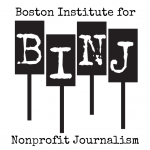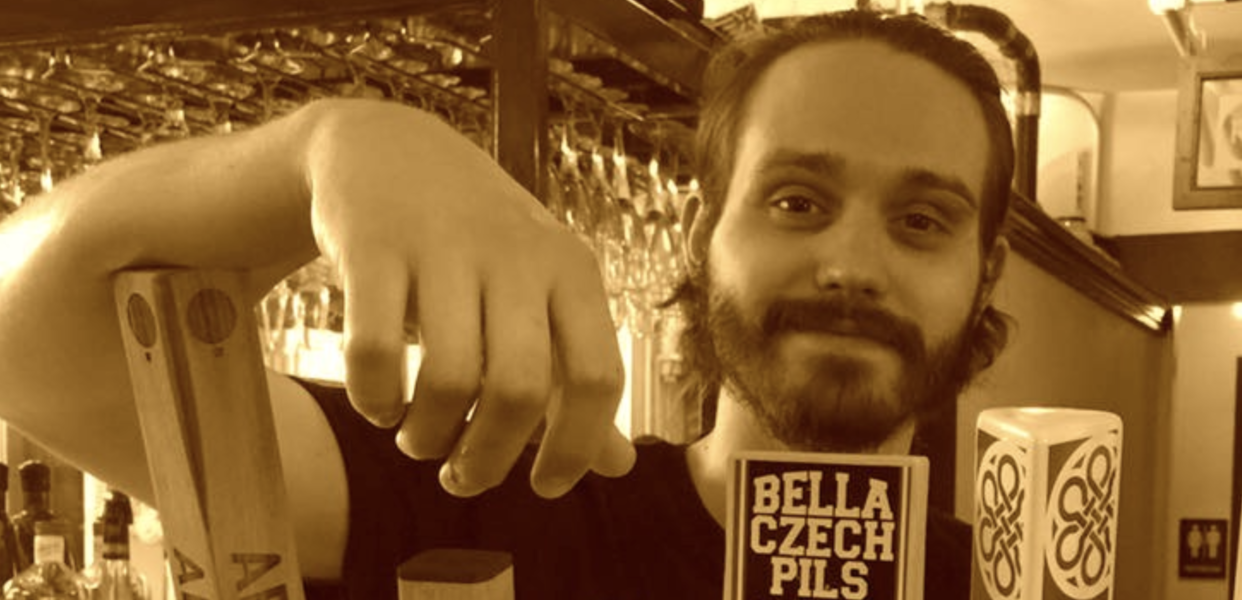An East Boston update to ‘The Thirsty Games’
This article is part of ongoing coverage by the Boston Institute for Nonprofit Journalism and its partner publications about the impact of inequitable liquor licensing in Boston and the hope that can arise in neighborhoods with increases in restaurant and nightlife opportunities.
It’s a Wednesday summer evening, and Sean Von Clauss is performing in the corner of a dimly lit cafe in East Boston. Behind the venue’s nine wooden dinner tables, patrons at the eight-seat bar watch along enthusiastically. An antique-style rug covers most of the room, giving the place an intimate feel.
Von Clauss finishes a song, his soulful vocals backed by an acoustic guitar, and the small crowd cheers. “Have you been practicing without me?” someone yells. John Tyler, who owns the building housing the establishment, takes a couple of drinks over to guests sitting in the miniature beer garden outside, where lights twinkle and Von Clauss’s music floats into the early evening breeze.
Maverick Marketplace Cafe is a restaurant and bar housed in the similarly named incubator building, Maverick Marketplace, where 16 other small local businesses also live. As part of the incubator business model, budding entrepreneurs rent space to grow their enterprise in a community environment. For a small restaurant in this part of town, this opportunity is more unique than some may realize.
The cafe holds one of the 75 liquor licenses that the Massachusetts legislature, under pressure from Boston City Councilor-at-Large Ayanna Pressley and other advocates for neighborhoods where nightlife options are sparse, granted Boston in 2012. Of those licenses, 80 percent were allocated to businesses in areas like Eastie that have been historically underserved and underrepresented.
Due to a current state-imposed cap on licenses in the city, those which are available can sell on the private market for upwards of $350,000. There is also significant bureaucratic rigmarole that applicants may have to endure, only to be denied in the end “without prejudice.”
“We wouldn’t even have considered the $350,000,” says Tyler. Along with his wife Melissa, John Tyler bought and renovated the former Welfare building on Maverick Street that had been abandoned for 24 years. The long road to the Welfare building’s transformation began in 2005 when the Tylers submitted a request to purchase the building from the City of Boston. After acquiring the appropriate permits and approvals and financing, the renovations began in earnest in 2012 with support from the city, financing by First Priority Credit Union, and more than $500,000 in owner equity.

Tyler adds that the newly available licenses were much more affordable and allowed them to diversify the cafe’s business. (When restaurateurs have to pay hundreds of thousands of dollars for a license, they often have to sell expensive food and beverages).
East Boston has traditionally been an immigrant town: Irish and Canadians in 1855, Italians and Russian Jews throughout the early 1900s. Nowadays the locals predominantly belong to the Latin American immigrant population, particularly from countries including Colombia and El Salvador. The Tylers, however, moved to East Boston in 2002 from the United Kingdom, where John was a ship captain on private yachts traveling around New England and the Caribbean.
“For us, it was a no-brainer to invest in our neighborhood,” he says. Tyler works closely with Danny and Maria Cordon, the owners of his building’s namesake cafe, and adds: “The next act of progression was to keep putting our money where our mouths were and start up a restaurant in the space. We felt that there was a need for it.”
For decades, the Maverick Square dive bar Eddie C’s was the only nightlife option in the area. Thanks in part to licenses freed up by the state over the past three years, though, other spots have opened, like La Hacienda Restaurant and Bar, Cafe Gigu, and Ecco Boston, the last two being relatively recent additions.
At first, Maverick Marketplace Cafe was just that — a cafe with brunch options. Now, a year after receiving its initial wine and beer liquor license, the Cafe has evolved into a full-fledged neighborhood hub with a beer garden and open mic nights. Its hyperlocal beers rotate on a daily basis, while Sunday brunches feature live jazz. Celtics and Red Sox fans can watch their teams at the bar, a minor luxury that was hardly available around here as recently as two years ago. Most recently, its liquor license has been expanded to also include mixed cocktails.
“There’s nothing else like this here [in East Boston],” says Von Clauss, who as a resident artist plays the venue every Wednesday night. “Everyone here knows each other. There’s always music going on here, almost everyday.”
Cordon, who was formerly the co-owner of Boston Brewin Coffee in Downtown Crossing, notes the disparity in liquor licensing between neighborhoods. “East Boston was in need of more offerings and things other neighborhoods have,” he says. “We have traditionally been the working man’s neighborhood, the backbone of the city … But not always with the same glory and trade.”
Cordon says that in the case of Maverick Marketplace Cafe, the liquor license creates job opportunities. “We used to have two employees,” he says. “Now we have 11.”
One cafe employee, Jeremy Peacock, is a server and a recent college graduate living in Eastie. “I’ve had jobs in downtown before,” he says, “but it’s really nice to be able to just walk three minutes to work. Most of the people who work here, live here.”
Adds Tyler: “We’ve seen a lot of people [in the cafe] who have been in the neighborhood for years and years. We also see new people coming in, which is a reflection of what’s happening in the neighborhood.”
As Maverick is being groomed by real estate developers to be the Hub’s next “it neighborhood,” the disconnect between the rapidly booming Boston proper and the formerly cast-off East Boston might be diminishing — but it’s still palpable. Kim Carvalhos has lived in Eastie for 15 years and is a regular at Maverick Marketplace. Sitting at the bar on a Tuesday night after a session of yoga — hosted at the Tylers’ apartment above the cafe and led by a tight-knit group who had met at the local YMCA — she talks about the shifting peoplescape.
“I have seen one-bedroom apartments asking for $2000,” says Carvalhos. “With all these condos … they’re selling, but I don’t know who’s buying them.”
From evictions and rent increases to the anxiety caused by it all, the major changes in East Boston are prevalent, and for certain people that’s not always a good thing. Maverick Marketplace may represent that change for some, but the cafe serves as a source of comfort and community for others.
“We know Madeline from ZUMIX really well,” says Tyler, referring to the cultural non-profit located nearby. The cafe is teaming up with the ZUMIX in booking live acts. Tyler adds: “There was a synergy there that developed organically.”
“People talk about gentrification, but there’s always byproducts when neighborhoods change,” Cordon says. “It’s still going to be the average man’s neighborhood, or it could be the up-and-coming professional neighborhood; there’s room for that too.”
Cordon says the underlying purpose of Maverick Marketplace is to “create opportunities for small businesses, new jobs, and [to] give a neighborhood what they want and deserve.”
“The building is a crossroads,” adds Cordon, recognizing how distinct his spot is in a neighborhood filled with Latino and Italian joints. “It’s about having offerings that are sprinkled across. We simply celebrate food and music.”










